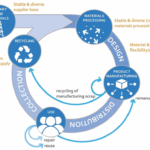The Implications of China’s Graphite Restrictions on the Energy Transition
By Nicole Amy Horner (ESM Foundation)
Four months after China restricted the export of germanium and gallium, it will be imposing similar restrictions on the export of graphite. These restrictions come at a time when the demand for graphite is increasing due to the mineral’s importance for the energy transition.
About a year ago, the United States attempted to limit China’s military and advanced AI capabilities by releasing new restrictions to control advanced AI chips made with U.S. inputs (such as technology, software, and equipment), known as “foreign direct product rules” (FDPRs). However, chips with less powerful integrated circuits were not subject to these FDPRs, so foreign companies could, in theory, buy those and combine them to achieve greater processing power. Last year’s restrictions, as well as the Chinese telecom giant Huawei having been added to the U.S. Entity list containing foreign parties subject to trade restrictions, led to Huawei being almost completely barred from working with American companies in 2019. This contributed to China increasing the development of its own semiconductor and chipmaking technologies.
By updating the FDPRs around a year later, on October 17, 2023, the U.S. is attempting to thwart efforts to its restrictions. In a press release by the Bureau of Industry and Security (BIS), Assistant Secretary of Commerce for Export Administration Thea D. Rozman Kendler stated: «By imposing stringent license requirements, we ensure that those seeking to obtain powerful advanced chips and chip manufacturing equipment will not use these technologies to undermine U.S. national security.” With the new measures, more Chinese firms will be added to the U.S. Entity list, and the export of additional artificial intelligence chips will be blocked.
While the U.S. is concerned about China’s backing of Huawei, the Chinese government has previously pointed out that the U.S. subsidizes its leading tech companies, too. China has also accused the U.S. of using the restrictions to undermine China’s economic development.
On October 20, China announced new restrictions on the export of graphite. Starting December 1, Chinese exporters will have to hold licenses to ship two types of the material, including “high-purity, high-hardness and high-intensity synthetic graphite material and natural flake graphite and its products”. Although this measure doesn’t explicitly target any specific countries, the US is one of China’s top customers, alongside Japan, India, and South Korea.
With carbon neutrality being a goal that most countries strive toward, the demand for electric vehicles (EVs) is increasing. Graphite is vital for EV battery production as an essential constituent of anodes. It is also the material of choice in the production of electrodes inside electric arc furnaces (EAF) for steel production. Consequences of China’s graphite restrictions could be severe price spikes of graphite in the short term and, in the longer term, a further escalation of ongoing trade wars, which could impede the availability of certain raw materials for affected countries.
References
- Graphite. Britannica. October 24, 2023. https://www.britannica.com/science/graphite-carbon
- Graphite – Supply chain challenges & recommendations for a critical mineral. The Hague Centre for Strategic Studies. March 2022. https://hcss.nl/wp-content/uploads/2022/03/Graphite-Challenges-and-Recommendations-HCSS-2022.pdf
- Battery supply chain challenges. Raw Materials Information System (RMIS). https://rmis.jrc.ec.europa.eu/analysis-of-supply-chain-challenges-49b749
- Commerce Strengthens Restrictions on Advanced Computing Semiconductors, Semiconductor Manufacturing Equipment, and Supercomputing Items to Countries of Concern. Bureau of Industry and Security. October 17, 2023. https://www.bis.doc.gov/index.php/documents/about-bis/newsroom/press-releases/3355-2023-10-17-bis-press-release-acs-and-sme-rules-final-js/file#:~:text=Today’s%20rules%20reinforce%20the%20October,and%20ensure%20they%20remain%20durable
- China’s New Graphite Restrictions. Center for Strategic and International Studies. October 23, 2023. https://www.csis.org/analysis/chinas-new-graphite-restrictions
- Why China is restricting exports of graphite. The Economist. October 25, 2023. https://www.economist.com/business/2023/10/25/why-china-is-restricting-exports-of-graphite
- Huawei Building Secret Network for Chips, Trade Group Warns. Bloomberg. August 23, 2023. https://www.bloomberg.com/news/articles/2023-08-23/huawei-building-secret-chip-plants-in-china-to-bypass-us-sanctions-group-warns?embedded-checkout=true
- What to make of China’s latest restrictions on critical mineral exports. New Atlanticist. October 26, 2023. https://www.atlanticcouncil.org/blogs/new-atlanticist/what-to-make-of-chinas-latest-restrictions-on-critical-mineral-exports/
- Image by Freepik




